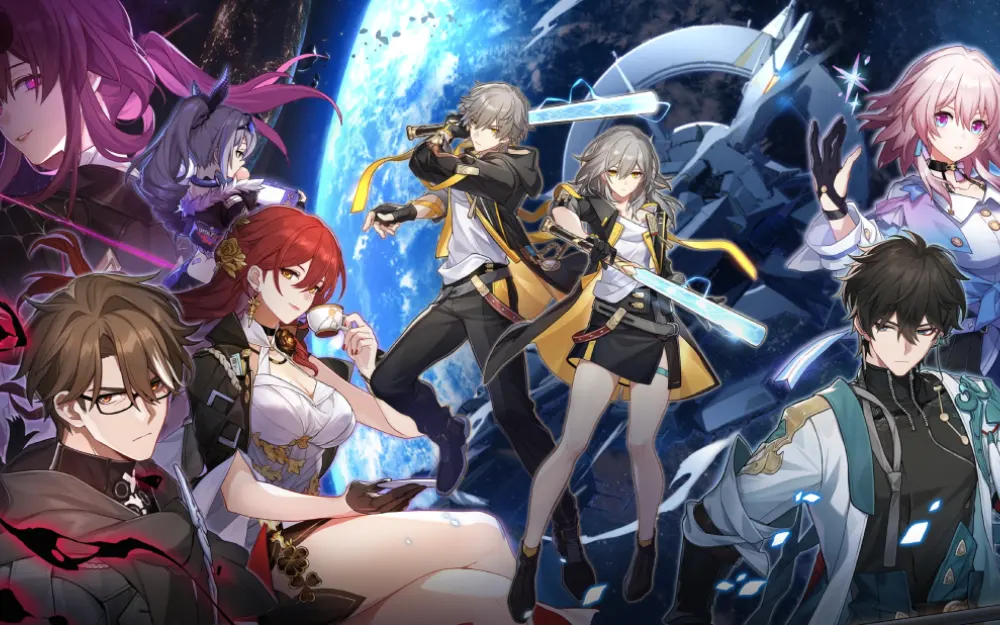The worldwide popularity of Genshin Impact is undeniable. One of gaming’s biggest success stories of recent years, it features stunning visuals, likable protagonists, and replayable content.
From the outside, it may appear like global occurrences appear out of nowhere, but this is rarely the case. The firm behind the game, formerly known as miHoYo but now called Hoyoverse, had a long road to success. Let’s examine the line of causes and effects that led to players encountering Teyvat and its vivid inhabitants.
Tech Otakus Save the World
Cai Haoyu, Liu Wei, and Luo Yuhao were Shanghai Jiao Tong University classmates who bonded through their love of anime. The trio intended to make their own anime games, but there were few studios in China in the mid-2000s.
While finishing their studies, the three would build games in their leisure time, competing in various student game creation contests, and by the time they were nearing the end of their master’s degrees, Cai, Liu, and Luo decided to launch a business. As grads, their “safe” options had been constrained by the 2008 financial meltdown, so they decided to go all-in on their love and created miHoYo in 2012.
Because two of their given names, Haoyu and Yuhao, both have a H and a Y in them when written in English, the trio decided to capitalize those letters.
Of course, new businesses require funds and space, which grad students aren’t known for having in excess. According to Wenhui Daily’s Wei Zhong, the Shanghai Science and Technology Entrepreneurship Center granted the young miHoYo firm a 100,000 yuan (about 20,000 US dollars in today’s currency) interest-free credit. In addition, for the first six months, the Entrepreneurship Center supplied fifty square meters of rent-free office space.
Despite the fact that anime-style games were not considered profitable in China at the time, the three persisted in developing them. Liu Wei, the new president of miHoYo, saw this as an unexplored market. He believed that establishing brand loyalty through content made by fans for fans would lead to repeat business.
Even as miHoYo’s fortunes grew over the next decade, the majority of the company’s early hires were players; miHoYo had yet to prove that anime games were a respectable business, which limited their applicant pool, and bringing on devoted players fit with the company’s philosophy that fans would make the best product.
The Honkai Series

In 2014, miHoYo launched its third game, Honkai Gakuen 2, known as Gun Girl Z, which proved to be their first commercial hit. The game centers around anime schoolgirls fighting off hordes of zombies.
In an interview, Liu Wei recalled being amazed as his Alipay account (the Chinese version of PayPal founded by the multinational conglomerate Alibaba) grew in the early days of the game’s release. “I was young and had millions in my pockets,” he recalls. “I was very ecstatic.”
But it wasn’t until their next game, Honkai Impact 3rd, that they achieved a really global smash hit.
The free-to-play approach of Honkai Impact 3rd made it available to a large audience, and miHoYo kept in touch with the community to make sure it was still something people were interested in. Unlike its predecessors, which were mostly 2D shooters, this game featured 3D hack-and-slash gameplay, and its scenario was expanded upon in a Chinese manhua (manga) series.
Since Honkai was so well received in Asia (one million downloads in Japan in its first two weeks), it soon became available in other parts of the world. Indeed, miHoYo’s tactic of creating a devoted fanbase may have backfired a bit; in 2021, a man was arrested for reportedly invading miHoYo’s studios with a knife with the aim of murdering Cai, Liu, and Luo because a special bunny girl attire wasn’t made available to Chinese gamers.
Honkai Impact 3rd is still being worked on, and a successor to the game called Honkai Star Rail is currently in the works. However, the global success of Honkai Impact 3rd would be insignificant in comparison to the success of the studio’s next major release in 2020.
Genshin Impact
In 2013, three of my best friends from college decided to create miHoYo, and by 2017, the company had hundreds of employees. The company announced its next big game would be an enormous open-world fantasy role-playing game at the 2019 Electronic Entertainment Expo (E3).
As stated by Polygon at the time, despite the fact that some individuals were quick to dismiss Genshin Impact as an anime clone of Breath of the Wild, the game was nevertheless able to attract player attention with its graphics and open-world gameplay.
It is one of the most successful Chinese games to ever launch on the worldwide market since more than five million of its ten million pre-registrations came from outside of China. This makes Genshin Impact one of the most successful Chinese games ever to launch on a global market.
The success of Genshin Impact was also positive: miHoYo spent an estimated one hundred million United States dollars (USD) on marketing and production, making it one of the most expensive games ever developed; when adjusted for inflation, it was more expensive than The Witcher 3, which was the previous record holder.
Throughout the majority of the development of Genshin Impact, miHoYo has been lobbying for the right to go public with its shares of stock. After three years of bureaucratic delays, miHoYo decided to pull their IPO just before the launch of Genshin Impact because Chinese regulators were reluctant to authorize fresh public offerings from game businesses in the wake of a spate of industry scandals ranging from market manipulation to murder.
By the end of 2020 (Genshin Impact was published in September of that year), the game was reportedly making around $6 million USD each day, peaking at $14 million USD on October 21.
Cai Haoyu, Liu Wei, and Luo Yuhao, already on the rise thanks to Honkai Impact 3rd‘s success, became filthy rich thanks to the cancellation of the IPO and Genshin Impact‘s record revenue.
Under CCP and Prosperity
Amazing success in China, of course, implies cooperating with the Chinese Communist Party. On September 24, 2021, miHoYo formally joined the Party by electing a Party Committee led by Liu Wei. Only about 10% of people who apply to join the Party really do so. This is true whether they are applying as a business or an individual.
Regardless of the leaders’ true political leanings, the primogem-laced financial infusion at miHoYo suggests that they are adopting the corporate tagline “tech otakus save the world” to heart. Cai, Liu, and Luo have invested in nuclear fusion research and development and are collaborating with their alma mater’s medical school to create brain-computer connections.
Who knows what miHoYo will do under their new branding of Hoyoverse if Honkai Star Rail turns out to be another hit given the amount of investing they have planned to make in the game.







